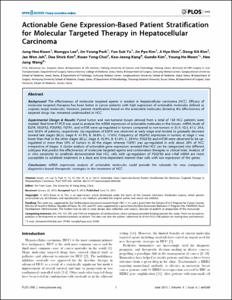Actionable Gene Expression-Based Patient Stratification for Molecular Targeted Therapy in Hepatocellular Carcinoma
- Keimyung Author(s)
- Kang, Koo Jeong
- Department
- Dept. of Surgery (외과학)
- Journal Title
- PLoS One
- Issued Date
- 2013
- Volume
- 8
- Issue
- 6
- Abstract
- Background
The effectiveness of molecular targeted agents is modest in hepatocellular carcinoma (HCC). Efficacy of molecular targeted therapies has been better in cancer patients with high expression of actionable molecules defined as cognate target molecules. However, patient stratification based on the actionable molecules dictating the effectiveness of targeted drugs has remained understudied in HCC.
Experimental Design & Results
Paired tumor and non-tumoral tissues derived from a total of 130 HCC patients were studied. Real-time RT-PCR was used to analyze the mRNA expression of actionable molecules in the tissues. mRNA levels of EGFR, VEGFR2, PDGFRβ, FGFR1, and mTOR were up-regulated in tumors compared to non-tumors in 35.4, 42.3, 61.5, 24.6, and 50.0% of patients, respectively. Up-regulation of EGFR was observed at early stage and tended to gradually decrease toward late stages (BCLC stage A: 41.9%; B: 30.8%; C: 17.6%). Frequency of VEGFR2 expression in tumors at stage C was lower than that in the other stages (BCLC stage A: 45.9%; B: 41.0%; C: 29.4%). PDGFRβ and mTOR were observed to be up-regulated in more than 50% of tumors in all the stages whereas FGFR1 was up-regulated in only about 20% of HCC irrespective of stages. A cluster analysis of actionable gene expression revealed that HCC can be categorized into different subtypes that predict the effectiveness of molecular targeted agents and combination therapies in clinical trials. Analysis of in vitro sensitivity to sorafenib demonstrated that HCC cells with up-regulation of PDGFRβ and c-Raf mRNA are more susceptible to sorafenib treatment in a dose and time-dependent manner than cells with low expression of the genes.
Conclusions
mRNA expression analysis of actionable molecules could provide the rationale for new companion diagnostics-based therapeutic strategies in the treatment of HCC.
- Keimyung Author(s)(Kor)
- 강구정
- Publisher
- School of Medicine
- Citation
- Hee Jung Wang et al. (2013). Actionable Gene Expression-Based Patient Stratification for Molecular Targeted Therapy in Hepatocellular Carcinoma. PLoS One, 8(6), e64260–e64260. doi: 10.1371/journal.pone.0064260
- Type
- Article
- ISSN
- 1932-6203
- Appears in Collections:
- 1. School of Medicine (의과대학) > Dept. of Surgery (외과학)
- 파일 목록
-
-
Download
 oak-aaa-04192.pdf
기타 데이터 / 2.57 MB / Adobe PDF
oak-aaa-04192.pdf
기타 데이터 / 2.57 MB / Adobe PDF
-
Items in Repository are protected by copyright, with all rights reserved, unless otherwise indicated.